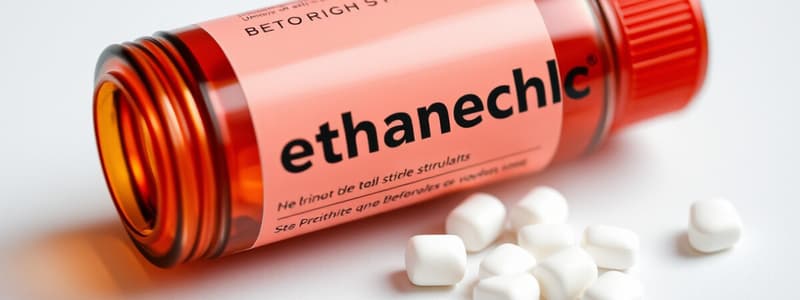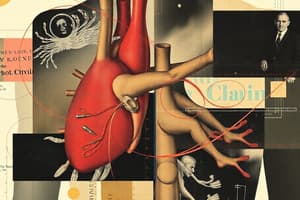Podcast
Questions and Answers
Which are the trade names for Bethanechol?
Which are the trade names for Bethanechol?
- Duvoid (correct)
- Urecholine (correct)
- Urabeth (correct)
- None of the above
What is the pregnancy category of Bethanechol?
What is the pregnancy category of Bethanechol?
Category C
What therapeutic class does Bethanechol belong to?
What therapeutic class does Bethanechol belong to?
Urinary tract stimulant
What is the pharmacological classification of Bethanechol?
What is the pharmacological classification of Bethanechol?
What are the indications for using Bethanechol?
What are the indications for using Bethanechol?
What is the main action of Bethanechol?
What is the main action of Bethanechol?
What is one therapeutic effect of Bethanechol?
What is one therapeutic effect of Bethanechol?
How is Bethanechol absorbed after oral administration?
How is Bethanechol absorbed after oral administration?
Bethanechol crosses the blood-brain barrier.
Bethanechol crosses the blood-brain barrier.
What is known about the metabolism and excretion of Bethanechol?
What is known about the metabolism and excretion of Bethanechol?
What is the half-life of Bethanechol?
What is the half-life of Bethanechol?
What is the onset time for oral administration of Bethanechol?
What is the onset time for oral administration of Bethanechol?
What are contraindications for Bethanechol?
What are contraindications for Bethanechol?
What precautions should be taken when administering Bethanechol?
What precautions should be taken when administering Bethanechol?
What are some common adverse reactions to Bethanechol?
What are some common adverse reactions to Bethanechol?
Which medications may interact with Bethanechol?
Which medications may interact with Bethanechol?
How should Bethanechol be administered?
How should Bethanechol be administered?
What is the adult oral dosage for Bethanechol?
What is the adult oral dosage for Bethanechol?
What is the pediatric oral dosage for Bethanechol?
What is the pediatric oral dosage for Bethanechol?
What are the forms in which Bethanechol is available?
What are the forms in which Bethanechol is available?
What should be monitored in patients taking Bethanechol?
What should be monitored in patients taking Bethanechol?
What lab test considerations should be made when using Bethanechol?
What lab test considerations should be made when using Bethanechol?
What should be done in case of Bethanechol overdose?
What should be done in case of Bethanechol overdose?
Flashcards are hidden until you start studying
Study Notes
Bethanechol Overview
- Trade names include Duvoid, Urabeth, and Urecholine.
- Classified as a Category C drug for pregnancy.
- Functions as a urinary tract stimulant within the cholinergic pharmacological class.
Indications and Actions
- Primarily used for postpartum and postoperative nonobstructive urinary retention, also effective for neurogenic bladder.
- Stimulates cholinergic receptors, resulting in:
- Contraction of the urinary bladder
- Reduced bladder capacity
- Enhanced ureteral peristaltic waves
- Increased gastrointestinal peristalsis and gastric secretions
Pharmacokinetics
- Poorly absorbed when taken orally, necessitating larger doses compared to subcutaneous administration.
- Does not penetrate the blood-brain barrier.
Administration and Dosage
- Administered orally (PO) or subcutaneously (SC).
- Adult oral dosage ranges from 25-50 mg three times daily; pediatric dosage is 0.2 mg/kg three times daily.
- Adult SC dosage is typically 5 mg three to four times daily; pediatric dosage is 0.06 mg/kg three times daily.
Side Effects and Interactions
- Common side effects include headache, malaise, lacrimation, bronchospasm, bradycardia, and abdominal discomfort.
- Life-threatening reactions may involve heart block and syncope.
- Drug-drug interactions with quinidine and anticholinergics may reduce effectiveness or provoke hypotension.
Monitoring and Toxicity
- Monitor blood pressure, pulse, and respiratory rates both pre- and post-administration.
- Watch for signs of toxicity such as sweating, flushing, and salivation; atropine sulfate is the antidote for overdose.
- May elevate levels of serum AST, amylase, and lipase in lab tests.
Availability and Assessment
- Available in tablet forms of 5 mg, 10 mg, 25 mg, and 50 mg, as well as a 5 mg/mL injection.
- Assess for bladder distention and postvoid residual as necessary.
Studying That Suits You
Use AI to generate personalized quizzes and flashcards to suit your learning preferences.



